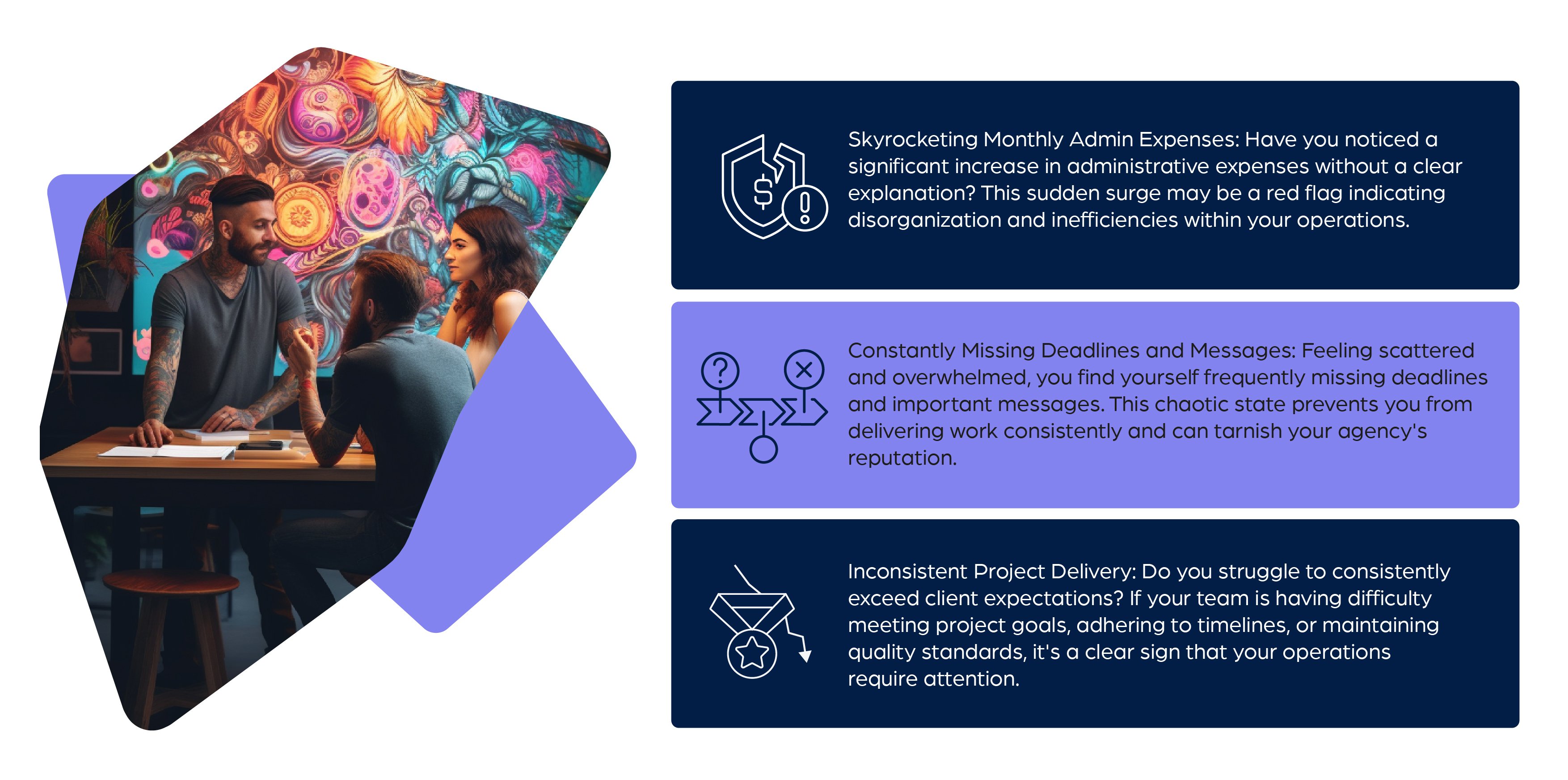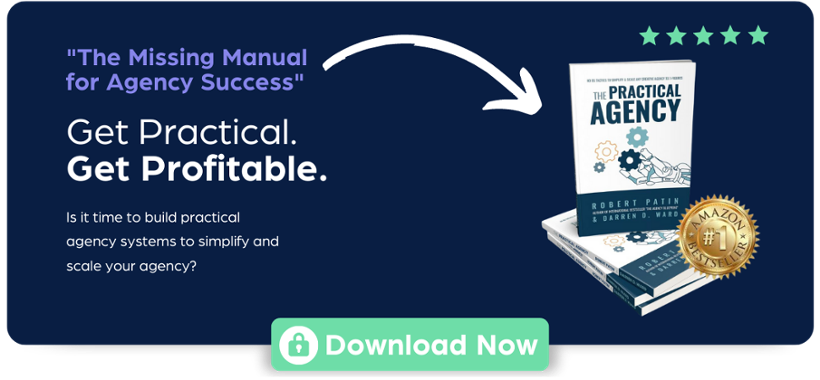
Do you regularly wake up in the morning already dreading the daily onslaught of emergencies in your creative agency? Feeling suffocated by your team’s heavy reliance on you to complete basic tasks?
When you allow yourself to become too centralized within your business, you become a roadblock to your success. The less clearly defined operational systems your agency has, the more frustrated you as the agency owner will become. But luckily, it is possible to regain control over your internal operations if you follow the right strategy.
3 warning signs your operations are getting out of control

When you're too entrenched in the weeds of your own businesses, you often become oblivious to the warning signs of operational chaos. You become so accustomed to your agency’s routines that you start to overlook the possibility of better approaches.
Could your agency’s operations be at risk of spiraling out of control? Take a temperature check with these warning signs to see if your business is currently experiencing operational chaos:
- Skyrocketing Monthly Admin Expenses: Have you noticed a significant increase in administrative expenses without a clear explanation? This sudden surge may be a red flag indicating disorganization and inefficiencies within your operations.
- Constantly Missing Deadlines and Messages: Feeling scattered and overwhelmed, you find yourself frequently missing deadlines and important messages. This chaotic state prevents you from delivering work consistently and can tarnish your agency's reputation.
- Inconsistent Project Delivery: Do you struggle to consistently exceed client expectations? If your team is having difficulty meeting project goals, adhering to timelines, or maintaining quality standards, it's a clear sign that your operations require attention.
When you're deeply immersed in the intricate workings of your own agency, it's easy to become oblivious to the warning signs of operational chaos. Familiarity with your routines can blind you to the potential for better approaches. Before we delve into the underlying causes, take a moment to take the blinders off and gauge if any of these indicators are present in your own business. If yes - your operations could be at risk of spiraling out of control (if they haven’t already).
The 3 main culprits of operational chaos
No agency owner ever starts their business wanting to feel disorganized and stressed. But as one client turns into a dozen and you start hiring more team members, it can be difficult to keep on top of the smaller, yet crucial details.
Unfortunately, the reality is that the main person responsible for letting things get out of hand is you. But that also means that you have the power to turn things around. As you look for ways to start eliminating unnecessary chaos from your business, consider these three common culprits:
- Self-Created Chaos: As the captain of the ship, your behavior matters. If you overreact to problems that arise within your agency (such as making an impulsive decision or raising your voice with a team member) you significantly impact the overall operational environment. By becoming more mindful of the way you are reacting to hiccups in your agency, you can prevent them from escalating.
- Overarching Micromanagement: When faced with significant problems or anxieties from past failures, it’s a common knee-jerk reaction to resort to micromanagement. While you may convince yourself tightening control will prevent future mistakes, this approach restricts team progress and prevents individuals from taking ownership of their responsibilities. This puts more stress on you, prevents your team from developing their skills, and makes it difficult to adhere to timelines.
- Saving the Day Syndrome: As the agency owner and face of the business, it's natural to want to be the hero when things go wrong. However, constantly swooping in to save the day creates dependency and perpetuates a cycle of repeated errors. If you want to empower your team so they can learn, grow, and take responsibility for their work.
If you are experiencing operational chaos within your creative agency, chances are of one of these culprits is silently wreaking havoc on your business.
How to overcome operational chaos
To overcome operational chaos, it's critical to streamline communication processes across all of your internal agency systems. To get your entire team back on the same page, follow these key steps:
- Optimize internal documentation processes: Establish clear communication standards across all platforms, ensuring that information flows seamlessly within the agency (email, Slack, project management system, etc).
- Enhance creative brief processes: Ensure that the creative briefs your team uses to execute client work is capturing all essential information, leaving no room for ambiguity or confusion.
- Develop effective scope management: Ensure you are defining project scopes as precisely as possible during the sales process, and conduct internal launch meetings to align the operations team with client expectations. Consider recording your sales calls to replay for the operations team so no detail is forgotten.
- Prioritize the revision management process: Establish a comprehensive revisions process that includes documentation of feedback and instructions. Consider utilizing reporting tools to track average revision rounds per project, for example, to help you identify areas that need improvement.
Your creative agency will only be successful if you make streamlining your communication a priority. The less effectively your team communicates, the harder it will become to decentralize yourself, and consequently tame the operational chaos.
3 strategies to effectively triage client issues
If your agency has, or is currently experiencing operational chaos, chances are you’ve also experienced client complaints as well. This is the natural consequence of choosing to prioritize things like making sales and client work over the “boring” elements of running a creative agency (like analyzing creative briefs, updating project management systems, or running reports).
Luckily, client issues generally fall into the same three categories, making it easier to strategize how to prevent them. Think about the last time you had to address an unsatisfied client. Chances are, it was a result of one of the following issues:
Miscommunication:
The experience your client had while working with your agency was not what they were expecting. To avoid this problem in the future, make sure your team is:
- Communicating on the agreed-upon channels, while maintaining prompt response times to clients (eg. text messages are urgent, a direct message gets a response within 2 hours, and email requires a same-day response).
- Establish an agreed-upon schedule for the client to receive updates on project progress and milestones. Radio silence is one of the quickest ways to lose trust with a client, so don’t keep them in the dark and be honest if a project starts falling behind.
- Establish efficient feedback loops between your team and the client to ensure projects stay on track.
Scope Management:
The project scope is a pivotal detail that helps you determine how much to charge the client to retain ideal profit margins. However, when the project begins to deviate from the original agreement, costs will unavoidably go up, causing your profit margin to decrease. To make sure your client and operations team adhere to the project scope, make sure to:
- Dedicate time during the initial sales call to fully define the project scope.
- Host internal launch meetings to review sales calls and ensure everyone is aligned.
- Continuously monitor project scope to prevent scope creep.
Revisions Management:
Revisions are a natural part of the creative process. But a client that is requesting what seems like endless change requests is a sign that the initial project scope did not align with their vision. To avoid getting stuck in an endless revision cycle that leaves everyone frustrated, make sure to:
- Implement a clear, robust revisions process that includes documentation of all changes.
- Use project management tools to track and manage revisions effectively.
- Analyze revision patterns to identify areas of improvement and address any underlying issues.
Harmonizing your creative agency's operations for a profitable future
Imagine a life where the disorganization of your creative agency no affects your happiness outside of work. Instead of being glued to your email 24/7, constantly worrying about your clients, and fixing last-minute mistakes, invest in making the necessary changes your agency's systems need to grow.
Rebuilding a solid operational foundation will empower you to elevate your agency to new heights. Start today and witness the transformation in both your business and personal well-being.
